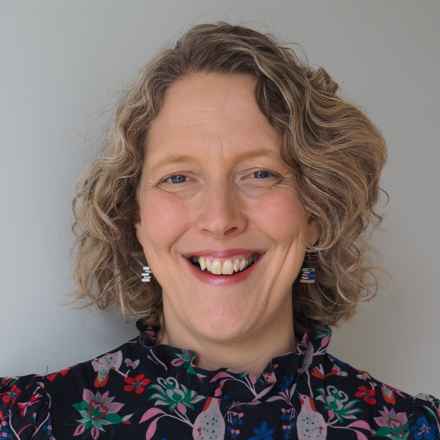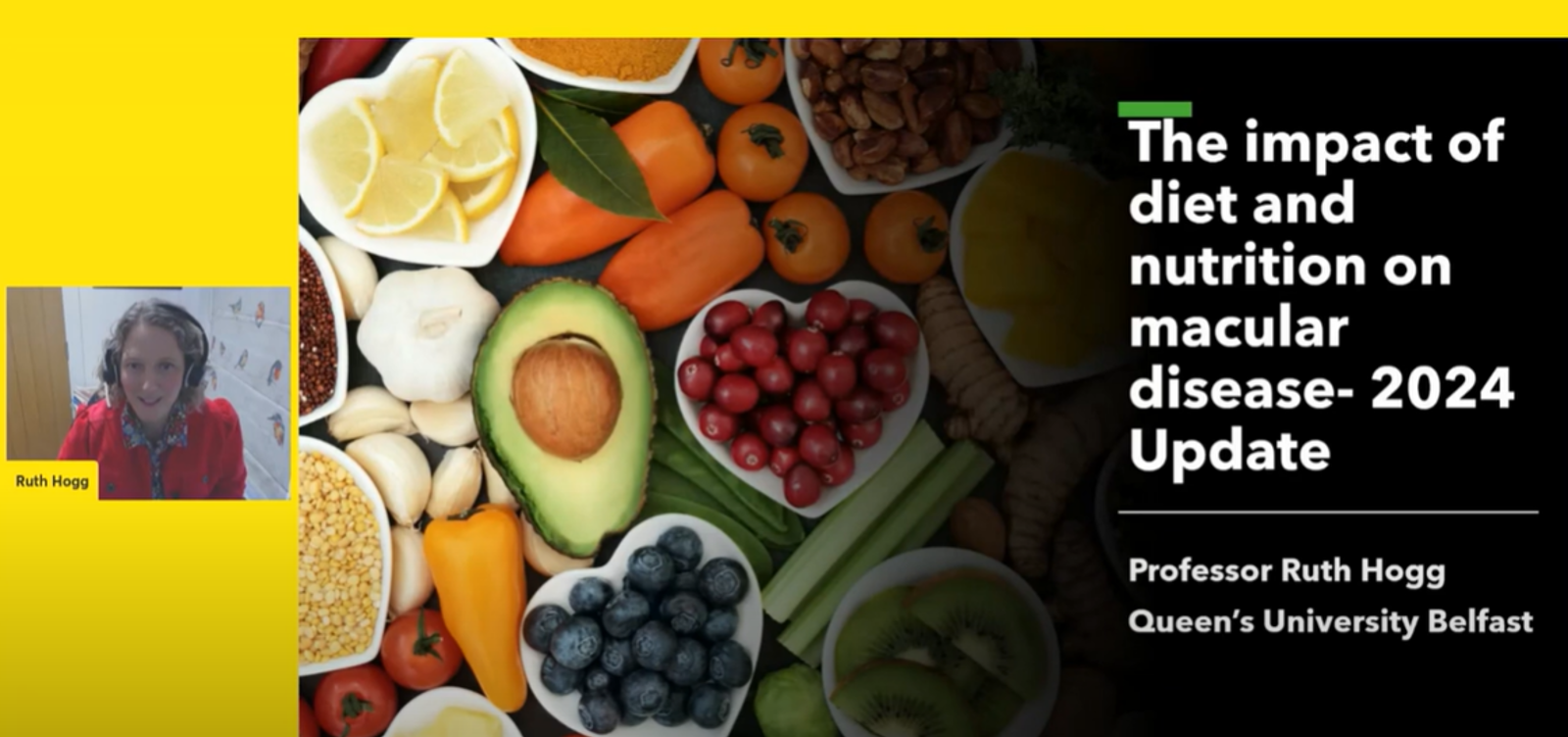Diet and nutrition - your questions answered
Posted: Thursday 26 September 2024
Are you considering cutting out alcohol or wondering whether supplements can really slow the progression of your macular disease? At the Macular Disease Conference 2024: Hope for the Future, leading macular researcher Professor Ruth Hogg addresses these questions and more, sharing her insights on the powerful role of diet and lifestyle in eye health.
Ruth, a professor of ophthalmic epidemiology and public health at Queen’s University Belfast, returned as a speaker for the second year in a row to tackle one of the most talked-about topics among macular patients.
While last year’s talk saw her explore the broader connection between nutrition and eye health, this year she focused on the most frequently asked questions.
Here were some of the top takeaways from Professor Hogg’s latest talk.
What does AREDS/AREDS2 mean?
“The AREDS study was initiated back in the 1990s, and AREDS1 reported in 2001, and then AREDS2 in 2013,” Ruth said. “Both of these studies together have played a very significant role in shaping our understanding of both diet's impact on age-related macular degeneration (AMD) and the role of supplements.
"So, it investigated the effects of high-dose antioxidants and zinc supplementation on AMD progression, and they recruited patients with a medium or large drusen in both eyes, and some patients with wet AMD in one eye and drusen in the other. Both of these studies found that the combination of vitamin C and E, beta-carotene, zinc, and copper reduced the risk of advanced AMD.”
Have there been any advances in this research since 2013?
Recent updates to the AREDS2 research have focused on the long-term effects of supplements on geographic atrophy (GA), otherwise known as late-stage dry AMD. The study revisited data from both AREDS1 and AREDS2 to assess how supplements impact the progression of GA.
Commenting on the research, Ruth said: “Those taking the antioxidant supplements experienced slower progression of the disease compared to those that did not take the supplements.” However, it was noted that “the supplements did not significantly slow the overall growth of GA in terms of area.”
This suggests that while supplements may help delay vision loss in GA, they don't necessarily prevent the disease's overall spread.
Read more on the AREDS2 study.
Should I take supplements if they don’t strictly conform to the AREDS2 formula?
AREDS2 supplements follow a specific formula, containing vitamins C and E, lutein, zeaxanthin, zinc and copper.
“These supplements have the very high-quality evidence available,” she said.
However, when it comes to other supplements, Professor Hogg advised more research is needed.
She said: “This is a difficult question to answer as there are lots of additional ingredients that there may be a good scientific rationale for why they may be helpful in AMD, but getting sufficient evidence that would satisfy a clinician to recommend them or the NHS to prescribe them is a very costly exercise.”
Read more about taking supplements, and always speak to your GP before taking them.
Are ultra-processed foods linked to AMD?
Describing ultra-processed foods, Ruth said: “It's usually things like sugary snacks, highly processed meats, pre-packaged meals, and they do typically tend to be high in unhealthy fats, sugars and additives, and low in essential nutrients.”
While Ruth highlighted that there is no definitive evidence linking ultra-processed foods to AMD, she believes any future research in this area would be expected to show that there may well be a relationship based on what we know about diet and AMD.
She said: “As yet, there's no real robust studies that have directly looked at ultra processed foods in the strict category that they're now understood, if we think of the research that is available on AMD and diet, we know that foods high in unhealthy fats, sugars and additives can contribute to inflammation and oxidative stress, which are both known to impact the development of progression of AMD.”
Should we adopt a Mediterranean diet?
The Mediterranean diet, which includes a variety of healthy, colourful foods, was as a topic discussed by Professor Hogg when she spoke at the Macular Disease Conference in 2023, as she was keen to highlight how it offers more benefits to eye health.
She said: “We should always be thinking in terms of a diet high in vegetables, fruits, fibre, olive oil, pulses and lean proteins such as fish and chicken. And while that may not describe the standard UK type diet, making small changes to the foods that you choose and cook until they become a habit in your lifestyle can be a good way of kind of gradually adopting this more sort of Mediterranean style of eating.”
Alcohol and the risk of AMD - should I stop drinking alcohol?
Professor Hogg acknowledged that studies have drawn “mixed results” when looking at the relationship between alcohol and AMD, however one recent review suggested an increased risk for early AMD with both moderate and heavy drinking compared to non-drinkers or occasional drinkers.
She said: “This research is probably more in line with the relationship between alcohol and some other diseases such as cancer, and in that you can't really justify alcohol consumption in terms of gaining a health benefit."
What other lifestyle changes can help reduce the risk of AMD?
Ruth highlighted that there is strong evidence to support the preventative impact of a healthy diet and a lifestyle on the development and progression of advanced AMD.
She said: “If you are considering supplements, remember to talk to your ophthalmologist or GP to decide which are the right choice for you. I'd also encourage you to make small changes in your diet and lifestyle, to adopt more practices suggested, and that this will not just benefit your eyes, but benefit your whole body."
Do you discuss AMD with your friends?
Professor Hogg’s final tip encouraged people to make more people aware of the importance of a healthy lifestyle when it comes to protecting your eye health.
She said: “Do discuss the increased risk of AMD with your family members and encourage them to adopt a healthy diet and lifestyle and regularly get their eyes checked by their local optometrist.”
Watch Professor Hogg's conference talk
Catch up on the Macular Disease Conference 2024
You can watch all the talks from our Macular Disease Conference 2024. Watch for the first time or catch up on any sessions you may have missed.

